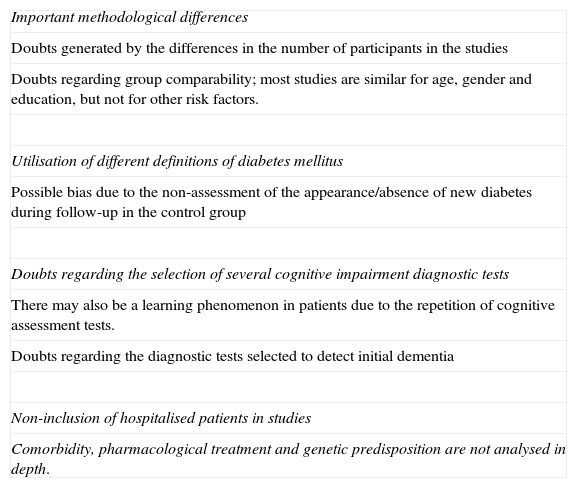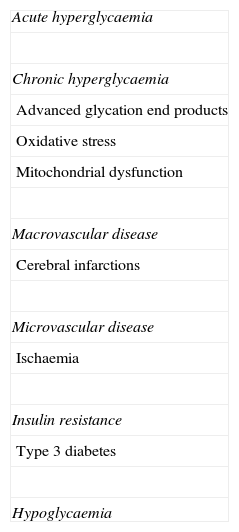Several studies have reported the existence of an epidemiological association between diabetes mellitus (DM) and dementia. Although this association is more evident for vascular dementia, it is also described in Alzheimer's disease (AD). In this review we evaluate the different hypotheses that may explain the association between DM and dementia. We can consider the existence of a diabetes type 3 as the situation that occurs when hyperinsulinemia in response to insulin resistance leads to a decrease of the brain insulin and a poor regulation of insulin-degrading enzyme; thus, beta-amyloid accumulates, among other mechanisms, by the decline of its degradation by insulin-degrading enzyme. Consequently, AD may be related, at least in part, to a brain insulin resistance. There are several studies that prove the concept that a better metabolic control, especially in not very old people, is associated with an increased cognitive performance. It is not known whether the use of any specific drug for the treatment of DM is better than any other. It is important for physicians responsible for the metabolic control of diabetic patients to know this possible association, and to explore cognition in the control visits of patients with DM.
Diversos estudios han mostrado la existencia de una asociación epidemiológica entre la diabetes mellitus (DM) y la demencia. Aunque esta asociación es más evidente para la demencia vascular, también se ha descrito entre DM y enfermedad de Alzheimer (EA). En esta revisión se evalúan las diversas hipótesis que pueden explicar la asociación entre DM y demencia. La hiperglucemia aguda, la microangiopatía como consecuencia de la hiperglucemia crónica, la hipoglucemia y la resistencia a la insulina son mecanismos potencialmente implicados en la relación entre diabetes y deterioro cognitivo. Respecto a la última, se ha propuesto el término de diabetes 3 como la situación que se da cuando la hiperinsulinemia en respuesta a la resistencia a la insulina comporta una disminución de la insulina efectiva cerebral, conllevando una mala regulación de la enzima degradante de la insulina y una acumulación de beta-amiloide. Así pues, la EA podría estar condicionada, al menos en parte, por una resistencia cerebral a la insulina. Existen diversos estudios que aportan el concepto de que un mejor control metabólico, especialmente en edades no muy avanzadas de la vida, comporta un mayor rendimiento cognitivo. No existe una clara evidencia de si el uso de alguna familia farmacológica en concreto para el tratamiento de la DM es mejor que otra. Es importante que los médicos responsables del control metabólico de los pacientes con DM conozcan su posible asociación con la demencia e incorporen la exploración de la cognición en las visitas de control de los pacientes con DM.








